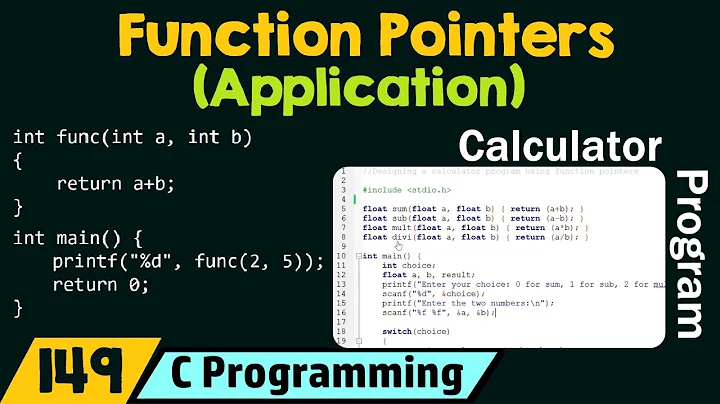Passing capturing lambda as function pointer
Solution 1
A lambda can only be converted to a function pointer if it does not capture, from the draft C++11 standard section 5.1.2 [expr.prim.lambda] says (emphasis mine):
The closure type for a lambda-expression with no lambda-capture has a public non-virtual non-explicit const conversion function to pointer to function having the same parameter and return types as the closure type’s function call operator. The value returned by this conversion function shall be the address of a function that, when invoked, has the same effect as invoking the closure type’s function call operator.
Note, cppreference also covers this in their section on Lambda functions.
So the following alternatives would work:
typedef bool(*DecisionFn)(int);
Decide greaterThanThree{ []( int x ){ return x > 3; } };
and so would this:
typedef bool(*DecisionFn)();
Decide greaterThanThree{ [](){ return true ; } };
and as 5gon12eder points out, you can also use std::function, but note that std::function is heavy weight, so it is not a cost-less trade-off.
Solution 2
Shafik Yaghmour's answer correctly explains why the lambda cannot be passed as a function pointer if it has a capture. I'd like to show two simple fixes for the problem.
-
Use
std::functioninstead of raw function pointers.This is a very clean solution. Note however that it includes some additional overhead for the type erasure (probably a virtual function call).
#include <functional> #include <utility> struct Decide { using DecisionFn = std::function<bool()>; Decide(DecisionFn dec) : dec_ {std::move(dec)} {} DecisionFn dec_; }; int main() { int x = 5; Decide greaterThanThree { [x](){ return x > 3; } }; } -
Use a lambda expression that doesn't capture anything.
Since your predicate is really just a boolean constant, the following would quickly work around the current issue. See this answer for a good explanation why and how this is working.
// Your 'Decide' class as in your post. int main() { int x = 5; Decide greaterThanThree { (x > 3) ? [](){ return true; } : [](){ return false; } }; }
Solution 3
Lambda expressions, even captured ones, can be handled as a function pointer (pointer to member function).
It is tricky because an lambda expression is not a simple function. It is actually an object with an operator().
When you are creative, you can use this! Think of an "function" class in style of std::function. If you save the object you also can use the function pointer.
To use the function pointer, you can use the following:
int first = 5;
auto lambda = [=](int x, int z) {
return x + z + first;
};
int(decltype(lambda)::*ptr)(int, int)const = &decltype(lambda)::operator();
std::cout << "test = " << (lambda.*ptr)(2, 3) << std::endl;
To build a class that can start working like a "std::function", first you need a class/struct than can store object and function pointer. Also you need an operator() to execute it:
// OT => Object Type
// RT => Return Type
// A ... => Arguments
template<typename OT, typename RT, typename ... A>
struct lambda_expression {
OT _object;
RT(OT::*_function)(A...)const;
lambda_expression(const OT & object)
: _object(object), _function(&decltype(_object)::operator()) {}
RT operator() (A ... args) const {
return (_object.*_function)(args...);
}
};
With this you can now run captured, non-captured lambdas, just like you are using the original:
auto capture_lambda() {
int first = 5;
auto lambda = [=](int x, int z) {
return x + z + first;
};
return lambda_expression<decltype(lambda), int, int, int>(lambda);
}
auto noncapture_lambda() {
auto lambda = [](int x, int z) {
return x + z;
};
return lambda_expression<decltype(lambda), int, int, int>(lambda);
}
void refcapture_lambda() {
int test;
auto lambda = [&](int x, int z) {
test = x + z;
};
lambda_expression<decltype(lambda), void, int, int>f(lambda);
f(2, 3);
std::cout << "test value = " << test << std::endl;
}
int main(int argc, char **argv) {
auto f_capture = capture_lambda();
auto f_noncapture = noncapture_lambda();
std::cout << "main test = " << f_capture(2, 3) << std::endl;
std::cout << "main test = " << f_noncapture(2, 3) << std::endl;
refcapture_lambda();
system("PAUSE");
return 0;
}
This code works with VS2015
Update 04.07.17:
template <typename CT, typename ... A> struct function
: public function<decltype(&CT::operator())(A...)> {};
template <typename C> struct function<C> {
private:
C mObject;
public:
function(const C & obj)
: mObject(obj) {}
template<typename... Args> typename
std::result_of<C(Args...)>::type operator()(Args... a) {
return this->mObject.operator()(a...);
}
template<typename... Args> typename
std::result_of<const C(Args...)>::type operator()(Args... a) const {
return this->mObject.operator()(a...);
}
};
namespace make {
template<typename C> auto function(const C & obj) {
return ::function<C>(obj);
}
}
int main(int argc, char ** argv) {
auto func = make::function([](int y, int x) { return x*y; });
std::cout << func(2, 4) << std::endl;
system("PAUSE");
return 0;
}
Solution 4
Capturing lambdas cannot be converted to function pointers, as this answer pointed out.
However, it is often quite a pain to supply a function pointer to an API that only accepts one. The most often cited method to do so is to provide a function and call a static object with it.
static Callable callable;
static bool wrapper()
{
return callable();
}
This is tedious. We take this idea further and automate the process of creating wrapper and make life much easier.
#include<type_traits>
#include<utility>
template<typename Callable>
union storage
{
storage() {}
std::decay_t<Callable> callable;
};
template<int, typename Callable, typename Ret, typename... Args>
auto fnptr_(Callable&& c, Ret (*)(Args...))
{
static bool used = false;
static storage<Callable> s;
using type = decltype(s.callable);
if(used)
s.callable.~type();
new (&s.callable) type(std::forward<Callable>(c));
used = true;
return [](Args... args) -> Ret {
return Ret(s.callable(std::forward<Args>(args)...));
};
}
template<typename Fn, int N = 0, typename Callable>
Fn* fnptr(Callable&& c)
{
return fnptr_<N>(std::forward<Callable>(c), (Fn*)nullptr);
}
And use it as
void foo(void (*fn)())
{
fn();
}
int main()
{
int i = 42;
auto fn = fnptr<void()>([i]{std::cout << i;});
foo(fn); // compiles!
}
This is essentially declaring an anonymous function at each occurrence of fnptr.
Note that invocations of fnptr overwrite the previously written callable given callables of the same type. We remedy this, to a certain degree, with the int parameter N.
std::function<void()> func1, func2;
auto fn1 = fnptr<void(), 1>(func1);
auto fn2 = fnptr<void(), 2>(func2); // different function
Solution 5
Not a direct answer, but a slight variation to use the "functor" template pattern to hide away the specifics of the lambda type and keeps the code nice and simple.
I was not sure how you wanted to use the decide class so I had to extend the class with a function that uses it. See full example here: https://godbolt.org/z/jtByqE
The basic form of your class might look like this:
template <typename Functor>
class Decide
{
public:
Decide(Functor dec) : _dec{dec} {}
private:
Functor _dec;
};
Where you pass the type of the function in as part of the class type used like:
auto decide_fc = [](int x){ return x > 3; };
Decide<decltype(decide_fc)> greaterThanThree{decide_fc};
Again, I was not sure why you are capturing x it made more sense (to me) to have a parameter that you pass in to the lambda) so you can use like:
int result = _dec(5); // or whatever value
See the link for a complete example
Related videos on Youtube
Cory Kramer
Software engineer with a civil engineering background and extensive experience in modeling and simulation. Passionate about writing robust, performant, and well-documented software to solve challenging real-world problems.
Updated on July 08, 2022Comments
-
 Cory Kramer almost 2 years
Cory Kramer almost 2 yearsIs it possible to pass a lambda function as a function pointer? If so, I must be doing something incorrectly because I am getting a compile error.
Consider the following example
using DecisionFn = bool(*)(); class Decide { public: Decide(DecisionFn dec) : _dec{dec} {} private: DecisionFn _dec; }; int main() { int x = 5; Decide greaterThanThree{ [x](){ return x > 3; } }; return 0; }When I try to compile this, I get the following compilation error:
In function 'int main()': 17:31: error: the value of 'x' is not usable in a constant expression 16:9: note: 'int x' is not const 17:53: error: no matching function for call to 'Decide::Decide(<brace-enclosed initializer list>)' 17:53: note: candidates are: 9:5: note: Decide::Decide(DecisionFn) 9:5: note: no known conversion for argument 1 from 'main()::<lambda()>' to 'DecisionFn {aka bool (*)()}' 6:7: note: constexpr Decide::Decide(const Decide&) 6:7: note: no known conversion for argument 1 from 'main()::<lambda()>' to 'const Decide&' 6:7: note: constexpr Decide::Decide(Decide&&) 6:7: note: no known conversion for argument 1 from 'main()::<lambda()>' to 'Decide&&'That's one heck of an error message to digest, but I think what I'm getting out of it is that the lambda cannot be treated as a
constexprso therefore I cannot pass it as a function pointer? I've tried makingxconstexpr as well, but that doesn't seem to help.-
 Jarod42 over 9 yearslambda can decay to function pointer only if they don't capture anything.
Jarod42 over 9 yearslambda can decay to function pointer only if they don't capture anything. -
BoBTFish over 9 years
-
 warrenm about 4 yearsFor posterity, the above-linked blog post now lives at devblogs.microsoft.com/oldnewthing/20150220-00/?p=44623
warrenm about 4 yearsFor posterity, the above-linked blog post now lives at devblogs.microsoft.com/oldnewthing/20150220-00/?p=44623 -
Gabriel Staples almost 4 years
-
-
Shafik Yaghmour over 9 years@T.C. See this question for details why it works
-
 dan-man over 8 yearsNote that in general, if you know the capture data at compile time, you can convert it to type data and then you're back to having a lambda with no capture - see this answer that I just wrote to another question (thanks to @5gon12eder's answer here).
dan-man over 8 yearsNote that in general, if you know the capture data at compile time, you can convert it to type data and then you're back to having a lambda with no capture - see this answer that I just wrote to another question (thanks to @5gon12eder's answer here). -
barney about 7 yearsWow That's amazing! So we just could use lambda's class inner pointers (to member function operator() ) to invoke stored lambdas in a wrapper class!! AMAZING!! Why do we ever need the std::function then? And is it possible to make lambda_expression<decltype(lambda), int, int, int> to automatically deduce/ these "int" parameters directly from the passed lambda itself?
-
Noxxer almost 7 yearsI've added a short version of my own code. this should be working with a simple auto f = make::function(lambda); But i'm quite shure you will find plenty of situation my code will not work. std::function is way more well constructed than this and should be the go to when you are working. This here is for education and personal use.
-
barney almost 7 yearsvery curious! Interestingly, how does it parse? Is the expression "C(Args...)" constructor taking template parameter pack? Why then its resulting type is valid return for "operator()" as far as I know constructors don't return any values so how does this "result_of" deduces the operator()'s return type from the C type itself?))
-
Noxxer almost 7 yearsI've edit now with a "full" example. I think i don't quite get the question right now. sry! I tried to code std::result_of but the code involves many 1000 lines in the std library. I gave up about this. I really can't tell you how it works by now. I can only say: When you call operator() with some parameters the code above will look up: Is there a solution for the expression and what is the result type? No constructor needed. So the Parameter you will pass to operator() will define which overload is the one you're trying to use. This isn't needed for lambda but for overloaded "normal" classes.
-
barney almost 7 yearsOh, I see, it uses std::result_of that is a new bit of STL magic ) I tried to understand it looks like its implementation uses some ideas of type deduction from your prev. implementation deducting somehow the RetType from T. Anyway you did very cool and elegant solution Appreciate it :)
-
Remy Lebeau almost 7 yearsThis solution involves calling the lambda via an
operator()implementation, so if I'm reading it right I don't think it would work to call the lambda using a C-style function pointer, would it? That is what the the original question asked for. -
Noxxer almost 7 yearsI disagree. When somebody asks "how can you use a C-Sytel Function Pointer for Object method" you would answer it with an example of a "Object-Method" Functionpointer. Since lambda is actually an Object, it was the very first thing i did in my answer. Second part was how to create your own "functionpointer feel-a-like" class and third to what it has evolved after some questions in the comments. I think that might help some people and also explains a lot how lambdas work. : )
-
Passer By almost 7 yearsYou claimed that lambdas can be handled as function pointers, which you didn't do. You created another object to hold a lambda, which does nothing, you could've just used the original lambda.
-
Noxxer almost 7 yearsA "member-function" pointer is a function pointer. : ) That "you need the object for it" was allways up in the text above. First code up there shows how it works. The rest is a bit more future possibilities with it. ; )
-
Alexander over 6 yearsWhy is it necessary to store
_objectas a member oflambda_expression? Can't the(_object.*_function)part be moved fromoperator ()to the constructor, and used to get a raw function pointer? -
Noxxer over 6 yearsI don't think that is possible. But i don't know for shure. In C++ you allways need two pointer for a class method. Imagine a class like
class a { void b(int){} };. Your Compiler will create the function intern likevoid __a__b(a * this, int){}. So you need a function pointer and also a class/struct pointer to actually call the member function. I've decided to use object as a copy so it would be save to actually return this class from a function. You could also use the object pointer but the function wrapper would be only valid in the same scope where the lambda was declared. -
ar2015 almost 6 yearsShouldn't the object have a longer lifespan than the pointer function then? I would like to use it for
glutReshapeFunc. -
Noxxer over 5 yearsFor a object method you would need a pointer or a reference. This ja not possible with a implementation like this. The copy of a lambda object is in most cases ok. The copy of a object for a object method would mean you will Call the method on the wrong instance. I guess thats not what you want. The implementation needs as said a pointer or reference of the instance. : )
-
Noxxer over 5 yearsAlso the implementation above expects the function operator () function. Which is a predefined function in lmabdas. I guess you want to use any function. So you have to store the method pointer also. The "automatic deduction" of function parameter becomes useless because you need to specifcy this as class template anyway to store the pointer correctly. : )
-
 n. m. over 5 yearsThis is not "passing capturing lambda as function pointer". This is "passing capturing lambda as an object that contains a function pointer among other things". There is a world of difference.
n. m. over 5 yearsThis is not "passing capturing lambda as function pointer". This is "passing capturing lambda as an object that contains a function pointer among other things". There is a world of difference. -
Nic over 5 yearsSide note: One common solution used by C stuff is to pass a
void*as the sole parameter. It's normally called a "user pointer". It's relatively lightweight, too, but does tend to require that youmallocout some space. -
Sneftel about 5 yearsThat lambda doesn't have a capture. The OP's issue is the capture, not having to deduce the function pointer type (which is what the
+trick gets you). -
 TheNegative almost 5 yearsi don't recommend this suggestion, things that tend to work magically, introduce new errors. and practices that go along with those errors. if you want to use std::function, you should see all kinds of ways that std::function can be used. because some ways maybe something that you don't want.
TheNegative almost 5 yearsi don't recommend this suggestion, things that tend to work magically, introduce new errors. and practices that go along with those errors. if you want to use std::function, you should see all kinds of ways that std::function can be used. because some ways maybe something that you don't want. -
 fiorentinoing almost 5 yearsforcing the N integer to be declared would be an elegant way to remember the client to avoid overwriting the function pointers at compile time.
fiorentinoing almost 5 yearsforcing the N integer to be declared would be an elegant way to remember the client to avoid overwriting the function pointers at compile time. -
 Hi-Angel almost 5 yearsThis doesn't answer the question. If one could use
Hi-Angel almost 5 yearsThis doesn't answer the question. If one could usestd::functionor a lambda — why wouldn't they? At the very least it's a more readable syntax. Usually one needs to use a function pointer to interact with C libraries (actually, with any external library), and sure you can't go modify it to accept an std::function or lambda. -
Chris Dodd about 4 yearsWhy bother with the
new-- std::function already stores the lambda on the heap AND avoids needing to remember calling delete. -
 Denis G. Labrecque over 3 yearsIs this a joke?
Denis G. Labrecque over 3 yearsIs this a joke?double*, double* double* double* double* ...Unreadable. -
underscore_d about 3 yearsBy "capture a lambda as a pointer", you mean type-erase inside
std::function... but OP clearly wanted a free function pointer. Having a pointer tostd::function, by advising the pointless antipattern of rawnew, doesn't qualify as relevant to the Q. -
 Vladimir Nikishkin over 2 yearsThis is not an answer, because you cannot pass that
Vladimir Nikishkin over 2 yearsThis is not an answer, because you cannot pass thatlambda.*ptrto the API that needs a function pointer. You would geterror: invalid use of non-static member function of type. -
Moritz over 2 years
static auto lambda_copy = lambda;static means that there is always only ever one copy of the lambda -
vlovero over 2 yearsIs there a way to make this thread safe?





